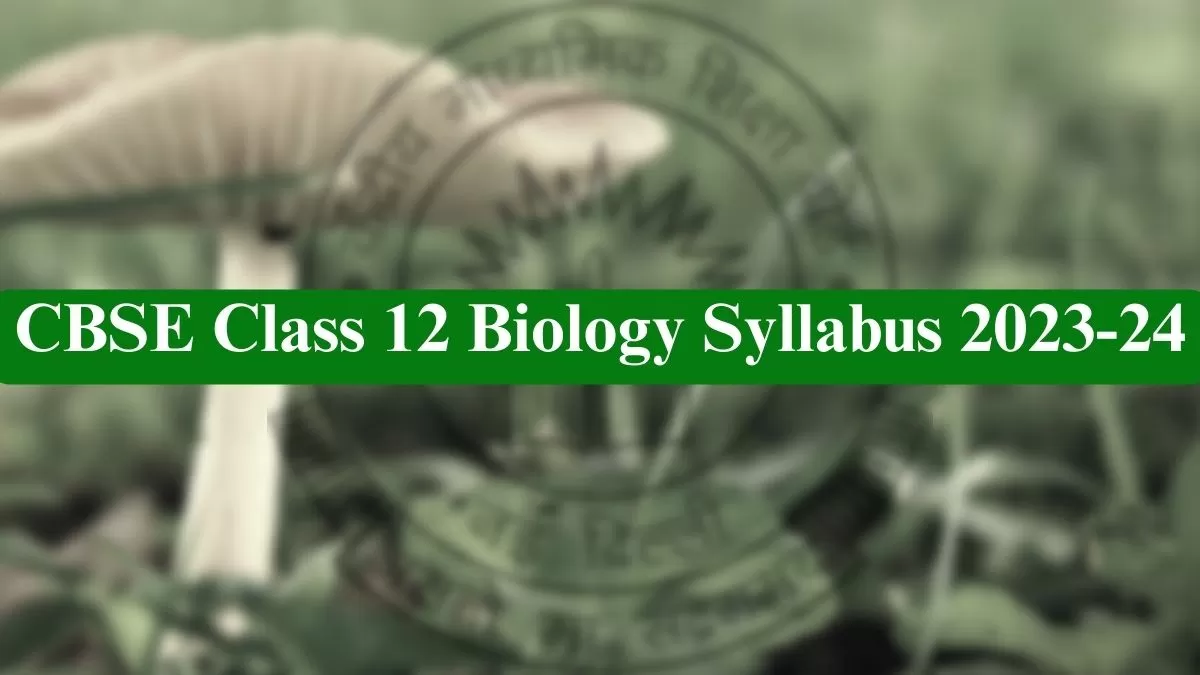CBSE Class 12 Biology Syllabus 2023-24: The Central Board of Secondary Education (CBSE) Senior Secondary (Class 12) examinations are underway. Students are revising for the exam by following the syllabus. Now that the CBSE Class 12 Biology is the next important exam for science stream students, the demand for the syllabus has increased. Students can check and download their CBSE Class 12 Biology revised syllabus and complete curriculum here. Along with the details of the course content, students can also check the question paper design and assessment details. The link to download the syllabus in PDF format has also been attached towards the end of this article.
Important* CBSE Class 12 Biology Most Repeated Questions to Prepare for Board Exam 2024
CBSE 12th Biology Syllabus Highlights
Subject: Biology
Subject Code: 044
Marks Breakup: Total = 100 (Theory 70 + Practical 30)
CBSE Class 12 Biology 2023-24 Course Structure
| Unit | Topic | Marks |
| VI | Reproduction | 16 |
| VII | Genetics and Evolution | 20 |
| VIII | Biology and Human Welfare | 12 |
| IX | Biotechnology and its Applications | 12 |
| X | Ecology and Environment | 10 |
TOTAL | 70 | |
CBSE Biology Syllabus for Class 12 2023-24
Unit-VI Reproduction
Chapter-2: Sexual Reproduction in Flowering Plants
Flower structure; development of male and female gametophytes; pollination - types, agencies and examples; out breeding devices; pollen-pistil interaction; double fertilization; post fertilization events - development of endosperm and embryo, development of seed and formation of fruit; special modes- apomixis, parthenocarpy, polyembryony; Significance of seed dispersal and fruit formation.
Chapter-3: Human Reproduction
Male and female reproductive systems; microscopic anatomy of testis and ovary; gametogenesis -spermatogenesis and oogenesis; menstrual cycle; fertilisation, embryo development upto blastocyst formation, implantation; pregnancy and placenta formation (elementary idea); parturition (elementary idea); lactation (elementary idea).
Chapter-4: Reproductive Health
Need for reproductive health and prevention of Sexually Transmitted Diseases (STDs); birth control - need and methods, contraception and medical termination of pregnancy (MTP); amniocentesis; infertility and assisted reproductive technologies - IVF, ZIFT, GIFT (elementary idea for general awareness).
Unit-VII Genetics and Evolution
Chapter-5: Principles of Inheritance and Variation
Heredity and variation: Mendelian inheritance; deviations from Mendelism – incomplete dominance, co-dominance, multiple alleles and inheritance of blood groups, pleiotropy; elementary idea of polygenic inheritance; chromosome theory of inheritance; chromosomes and genes; Sex determination - in humans, birds and honey bee; linkage and crossing over; sex linked inheritance - haemophilia, colour blindness; Mendelian disorders in humans - thalassemia; chromosomal disorders in humans; Down's syndrome, Turner's and Klinefelter's syndromes.
Chapter-6: Molecular Basis of Inheritance
Search for genetic material and DNA as genetic material; Structure of DNA and RNA; DNA packaging; DNA replication; Central Dogma; transcription, genetic code, translation; gene expression and regulation - lac operon; Genome, Human and rice genome projects; DNA fingerprinting.
Chapter-7: Evolution
Origin of life; biological evolution and evidences for biological evolution (paleontology, comparative anatomy, embryology and molecular evidences); Darwin's contribution, modern synthetic theory of evolution; mechanism of evolution - variation (mutation and recombination) and natural selection with examples, types of natural selection; Gene flow and genetic drift; Hardy - Weinberg's principle; adaptive radiation; human evolution.
Unit-VIII Biology and Human Welfare
Chapter-8: Human Health and Diseases
Pathogens; parasites causing human diseases (malaria, dengue, chikungunya, filariasis, ascariasis, typhoid, pneumonia, common cold, amoebiasis, ring worm) and their control; Basic concepts of immunology - vaccines; cancer, HIV and AIDS; Adolescence - drug and alcohol abuse.
Chapter-10: Microbes in Human Welfare
Microbes in food processing, industrial production, sewage treatment, energy generation and microbes as bio-control agents and bio-fertilizers. Antibiotics; production and judicioususe.
Unit-IX Biotechnology and its Applications
Chapter-11: Biotechnology - Principles and Processes
Genetic Engineering (Recombinant DNA Technology).
Chapter-12: Biotechnology and its Applications
Application of biotechnology in health and agriculture: Human insulin and vaccine production, stem cell technology, gene therapy; genetically modified organisms - Bt crops; transgenic animals; biosafety issues, biopiracy and patents.
Unit-X Ecology and Environment
Chapter-13: Organisms and Populations
Population interactions - mutualism, competition, predation, parasitism; population attributes - growth, birth rate and death rate, age distribution. (Topics excluded: Organism and its Environment, Major Aboitic Factors, Responses to Abioitic Factors, Adaptations)
Chapter-14: Ecosystem
Ecosystems: Patterns, components; productivity and decomposition; energy flow; pyramids of number, biomass, energy (Topics excluded: Ecological Succession and Nutrient Cycles).
Chapter-15: Biodiversity and its Conservation
Biodiversity-Concept, patterns, importance; loss of biodiversity; biodiversity conservation; hotspots, endangered organisms, extinction, Red Data Book, Sacred Groves, biosphere reserves, national parks, wildlife, sanctuaries and Ramsar sites.
Related: CBSE Biology Practical Syllabus for Class 12 2024: Download PDF
CBSE Class 12 Biology Exam 2024 Study Materials
- CBSE Biology Syllabus for Class 12 2024
- CBSE Biology Sample Paper Class 12 2023-24
- CBSE Class 12 Biology DELETED Syllabus 2023-24
- CBSE Class 12 Biology Additional Questions 2024
- CBSE Biology Previous Year Question Paper Class 12
- CBSE Class 12 Biology Revision Notes
- CBSE Class 12 Biology Mind Maps
- CBSE Class 12 Biology MCQs with Answers
- CBSE Class 12 Biology Question Paper and Solution 2023
CBSE Class 12 Biology Question Paper Design 2023-24
| Question Paper Design (Theory) 2023-24 | |
| Competencies | |
| Demonstrate Knowledge and Understanding | 50% |
| Application of Knowledge / Concepts | 30% |
| Analyse, Evaluate and Create | 20% |
Typology of questions:
VSA including MCQs, Assertion – Reasoning type questions; SA; LA- I; LA-II; Source-based/ Case-based/ Passage-based/ Integrated assessment questions.
An internal choice of approximately 33% would be provided.
CBSE Class 12 Biology Syllabus 2024 PDF Download
Download CBSE Class 12 Biology Syllabus PDF 2023-24 |
Related:
